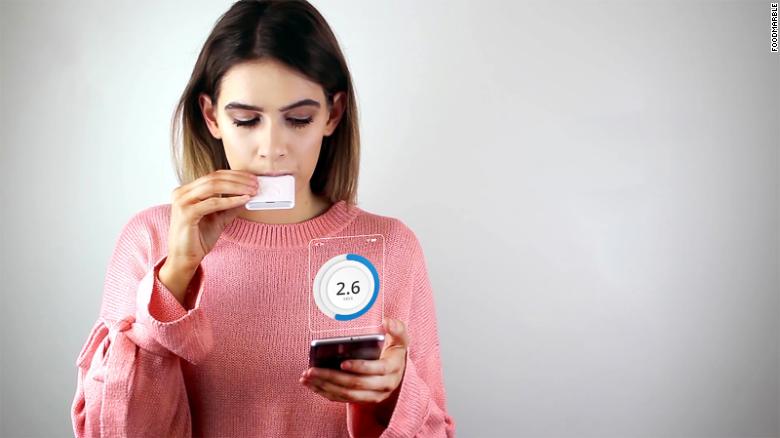How to take care of our digestive system?
1:51
London (CNN Business) -
Irish engineers Aonghus Shortt and Peter Harte founded FoodMarble, a startup that invented handheld devices, just 5 centimeters square, that test the hydrogen levels in a person's breath, a key sign of disturbances. digestives.
Indigestion, cramps and constipation are signs of irritable bowel syndrome (IBS), a disease of the digestive system that is estimated to affect one in ten people worldwide.
There is no cure, although it can be controlled with lifestyle and diet changes.
But figuring out which foods trigger a bad reaction for people can be a long and painstaking process.
It's also expensive: a 2019 study in six European countries found that it costs healthcare systems between € 937 (US $ 1,087) and € 2,108 (US $ 2,445) per patient per year.
Mindful eating can change your eating habits and your life in general.
So you can start practicing it
"Humans shouldn't produce hydrogen in their breath," explains Harte.
It occurs when food that has not been digested in the small intestine passes into the large intestine, where bacteria break it down, in a process called fermentation.
That process releases gases, such as hydrogen or methane, which can cause pain or inflammation.
The FoodMarble app has a database of nearly 1,000 foods, broken down by ingredients that are often difficult to digest.
FoodMarble's AIRE device, which was launched in 2018, allows users to analyze hydrogen after meals, giving them real-time information on which foods are harmful to their body.
The readings are sent via Bluetooth to the FoodMarble app, where users can record what they eat and, over the course of several weeks, detect the ingredients that trigger symptoms.
Democratize technology
Hydrogen breath tests have long been a method for diagnosing digestive diseases such as lactose intolerance and, more recently, small intestine bacterial overgrowth (SIBO), says Harte.
But he adds that the technology has not been widely accessible or convenient, often requiring multiple trips to the hospital for testing.
The epic fight between fast food and your gut bacteria
"By miniaturizing it, our goal is to democratize the technology," he says.
"We have this huge cohort of patients who have not had a way to overcome these difficult conditions. Our device is easy to use and understand, it gives them hope."
advertising
The global market for treatments for irritable bowel syndrome is also growing, and is expected to be worth more than $ 4 billion in 2028, up from $ 2 billion in 2020, according to a research company report. Market Research and Markets.
FoodMarble has sold 25,000 of its breath-sensing devices and just opened pre-orders for a new version that also measures methane levels.
They are available worldwide and cost between $ 190 and $ 260.
The FoodMarble device works similar to a breathalyzer.
But the company, which has raised € 5.5 million (US $ 6 million) in funding, also wants to enter the clinical market and its technology is currently being tested at the Johns Hopkins University of Medicine in the United States to improve the diagnosis of the SIBO.
Dr Pankaj Jay Pasricha, a professor leading the trial, says the device has so far outperformed other hydrogen breath test methods.
Dr. Tara Troy, a gastroenterologist who runs the Comprehensive Gastrointestinal Health clinic in Northbrook, Illinois, believes that a reusable device that can be taken home could be of enormous benefit to both physicians and patients.
FoodMarble is the only company you've heard of, although there are others, like Vivante Health, that offer a digital platform to monitor gut health.
As Troy explains to CNN Business, conducting breath tests in a clinical setting can be a logistical and personnel-intensive challenge.
The process requires a physician assistant to take a breath sample every 15 minutes for several hours.
"The appeal of the FoodMarble device is that it is not a one-time breath test," he says.
"A person could use it multiple times to gather multiple data points on which they can make better judgments and assessments of food sensitivities."
Why you should take a lunch break
"Empower patients"
Troy cautions that hydrogen breath tests are not a foolproof way to diagnose digestive problems and can sometimes produce false negatives and positives.
It is important to supplement them with other tests that can determine if a patient has more serious conditions, such as celiac disease or Crohn's disease.
But he says they are enormously valuable in offering some kind of "objective criteria" to IBS patients.
"I think it's very empowering for these individuals to be able to figure things out for themselves," says Troy.
The FoodMarble device "gives the patient that objective information that helps confirm that it is a real problem ... [and] gives them the opportunity to experiment with dietary factors," he adds.
digestive health devices











